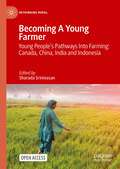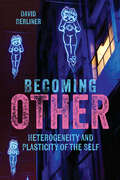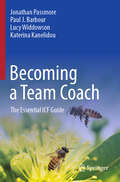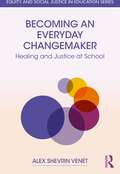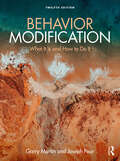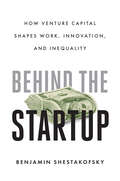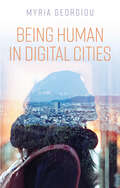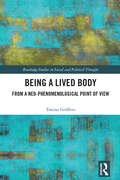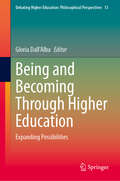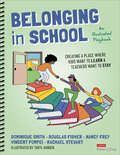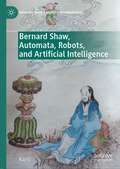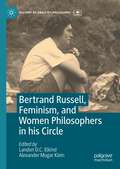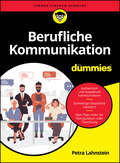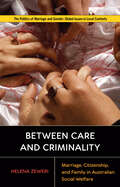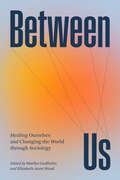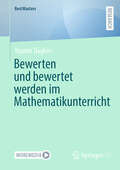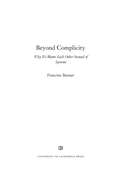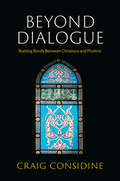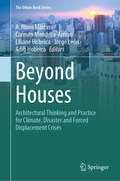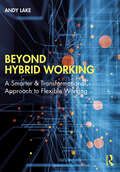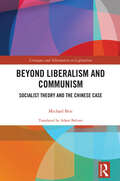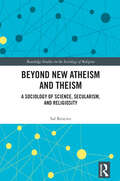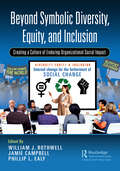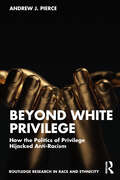- Table View
- List View
Becoming A Young Farmer: Young People’s Pathways Into Farming: Canada, China, India and Indonesia (Rethinking Rural)
by Sharada SrinivasanThis open access book is based on a multi-country collaborative research project focussing on Canada, China, India, and Indonesia.It responds directly and concretely to concerns about the generational sustainability of smallholder farming worldwide– reflected in the current UN Decade of Family Farming. Drawing on research that asks how (some) young people continue to pursue a (future) livelihood in farming, the book uses the life-course perspective and privileges voices of young farmers to show that movement away from farming such as time spent in education, migration and non-farm work does not exclude eventual farming futures.The book will be of interest to scholars and students of agrarian studies, anthropology, development studies, gender studies, human geography, rural sociology, and youth studies.
Becoming Other: Heterogeneity and Plasticity of the Self
by David BerlinerMost of us are conscious of having a single and stable self, but the self is more fragmented and plastic than we care to think. David Berliner explores the captivating world of identity through an array of astonishing experiences. From Napoleon doppelgangers to Philip Roth's alter-ego Nathan Zukerman and Wonder Woman cosplayers to anthropologists going native, he delves into the kaleidoscopic nature of the self and attempts to understand the heterogenous nature of identity. But Becoming Other also discusses a great cultural controversy of our time: who has the right to play at being whom?
Becoming a Team Coach: The Essential ICF Guide
by Jonathan Passmore Lucy Widdowson Paul J. Barbour Katerina KanelidouHow can you become the best team coach you can be? Written by highly experienced and award-winning authors and speakers, this book will help to equip you with the skills and knowledge you need to develop yourself as a professional team coach. It will encourage you to reflect on who you are, what you do and how you can enhance your skills. By drawing on the Gold Standard for team coach training and the latest coaching research, it will ensure your practice is both well informed by evidenced and up to the highest professional standards. The book will also help you as you undertake a team coaching training program, as part of ICF team coaching development. “Becoming a Team Coach is a critical resource created by top executive coaches that offers a cumulation of the authors’ experience and knowledge in the field. This guide provides practical frameworks and expert advice for both new and experienced coaches and combines theory with real-world applications for the most effective teaching. Whether you're just beginning or looking to refine your skills, this guide will help you make a significant impact.” Dr. Marshall Goldsmith is the Thinkers50 #1 Executive Coach and New York Times bestselling author of The Earned Life, Triggers, and What Got You Here Won’t Get You There. “Team coaching is a fast-growing phenomenon in the professional coaching field. Yet, there are still some misunderstandings, lack of clarity and frankly some mis-information. This book is a great resource for anybody who is interested in either being trained in team coaching or engaging this service for their organization. Easy to navigate and very practical, it is a real comprehensive resource for all.” Magdalena Nowicka Mook, CEO International Coaching Federation “As the world of coaching evolves, learning how to be a team coach is both a survival strategy for practitioners and a way to add more value to clients. While competencies have a role to play, the core skill is to move beyond them --- this book maps out how to achieve this”. David Clutterbuck
Becoming an Everyday Changemaker: Healing and Justice At School (Equity and Social Justice in Education Series)
by Alex Shevrin VenetEducators with a vision for more equitable, caring schools often struggle with where to begin. I’m just one teacher, where can I start to make change? Is it even possible? How do I do this within current constraints? In this new book, bestselling author Alex Shevrin Venet empowers everyday changemakers by showing how equity-centered trauma-informed practices can guide our approach to school change. Unlike other books on social justice, this powerful resource doesn’t tell you which changes to implement; instead, it focuses on helping you develop the skills, strategies, and tools for making change meaningful and effective.Topics include change opportunities and why trauma makes change harder; skills for navigating the change journey such as building relationships, working from strengths, and navigating many streams of information; and sustainable structures for lasting change. Throughout, there are reflection questions to use as conversation-starters with fellow changemakers, as well as Rest Stops so you can pause and process what you are thinking about and learning. This book will help you start your change journey now, putting you and your students on the path to equity, justice, and healing.
Behavior Modification: What It Is and How To Do It
by Garry Martin Joseph J. PearBehavior Modification is a comprehensive, practical presentation of the principles of behavior modification and guidelines for their application. It introduces forms of behavior modification ranging from helping children learn necessary life skills, to training pets, to solving personal behavior problems. It teaches practical “how-to” skills, including discerning long-term effects; designing, implementing, and evaluating behavioral programs; interpreting behavioral episodes; observing and recording behaviors; and recognizing instances of reinforcement, extinction, and punishment. The material is presented in an engaging, readable format that assumes no prior knowledge of behavior modification or psychology. Specific cases and examples clarify issues and make the principles real. Guidelines throughout provide a ready source to use as a reference in applying the principles. Questions for Learning, an average of 25 per chapter, are included to support students in checking their knowledge of the material when preparing for tests and exams. Application Exercises are also included in most chapters to assist students in the development of the practical skills they will need to complete behavior modification projects effectively. Behavior Modification is ideal for courses in Behavior Modification, Applied Behavior Analysis, Behavior Therapy, the Psychology of Learning, and related areas; and for students and practitioners of various helping professions—such as clinical psychology, counselling, education, medicine, nursing, occupational therapy, physiotherapy, psychiatric nursing, psychiatry, social work, speech therapy, and sport psychology—who are concerned directly with enhancing various forms of behavior development.
Behind the Startup: How Venture Capital Shapes Work, Innovation, and Inequality
by Benjamin ShestakofskyThis systematic analysis of everyday life inside a tech startup dissects the logic of venture capital and its consequences for entrepreneurs, workers, and societies. In recent years, dreams about our technological future have soured as digital platforms have undermined privacy, eroded labor rights, and weakened democratic discourse. In light of the negative consequences of innovation, some blame harmful algorithms or greedy CEOs. Behind the Startup focuses instead on the role of capital and the influence of financiers. Drawing on nineteen months of participant-observation research inside a successful Silicon Valley startup, this book examines how the company was organized to meet the needs of the venture capital investors who funded it. Investors push startups to scale as quickly as possible to inflate the value of their asset. Benjamin Shestakofsky shows how these demands create organizational problems that managers solve by combining high-tech systems with low-wage human labor. With its focus on the financialization of innovation, Behind the Startup explains how the gains generated by these companies are funneled into the pockets of a small cadre of elite investors and entrepreneurs. To promote innovation that benefits the many rather than the few, Shestakofsky compellingly argues that we must focus less on fixing the technology and more on changing the financial infrastructure that supports it.
Being Human in Digital Cities
by Myria GeorgiouHow is life in digital cities changing what it means to be human?In this perceptive book, Myria Georgiou sets out to investigate the new configuration of social order that is taking shape in today’s cities. Although routed through extractive datafication, compulsive connectivity, and regulatory AI technologies, this digital order nonetheless displaces technocentrism and instead promotes new visions of humanism, all in the name of freedom, diversity, and sustainability. But the digital order emerges in the midst of neoliberal instability and crises, resulting in a plurality of contrasting responses to securing digitally mediated human progress. While corporate, media, and state actors mobilize such positive sociotechnical imaginaries to promise digitally mediated human progress, urban citizens and social movements propose alternative pathways to autonomy and dignity through and sometimes against digital technologies. Investigating the dynamic workings of technology and power from a transnational and comparative perspective, this book reveals the contradictory claims and struggles for the future of digital cities and their humanity. In doing so, it will enrich understandings of digital urbanism, critical data studies, and critical humanist studies.
Being a Lived Body: From a Neo-phenomenological Point of View (Routledge Studies in Social and Political Thought)
by Tonino GrifferoThis book begins with the distinction between the so-called lived body or felt body (Leib) and the physical body (Körper), tracing the conceptual history of this distinction through key figures in philosophical and social thoughts and articulating a theory of the lived body that draws on the New Phenomenology developed by Hermann Schmitz. An explanation of our being-in-the-world in terms of a felt-bodily communication with all perceived forms and their affective-bodily resonance in us, Being a Lived Body integrates and critically assesses the leading theories of embodiment while presenting a new approach to the body. It will, therefore, appeal to scholars of philosophy, social theory, and anthropology with interests in phenomenology and embodiment.
Being and Becoming Through Higher Education: Expanding Possibilities (Debating Higher Education: Philosophical Perspectives #13)
by Gloria Dall’AlbaThis book focuses on the importance of an ontological dimension for today’s higher education, with critical attention to implications for the student experience, engagement, satisfaction, wellbeing, employability, (dis)embodiment and activism in which students take a stand on their own being and becoming. In accessible language, key philosophical ideas are explored for their relevance to contemporary higher education, integrating philosophical with pedagogical perspectives. Although much of the material has been published previously, there is value in bringing it together into a single volume in exploring an ontological dimension of higher education as it is embodied. In doing so, the book demonstrates benefits to pedagogy through sustained attention to philosophy and theory, and vice versa, thereby contributing to recent heightened interest in the philosophy and theory of higher education. This book is intended to prompt re-imagining the ways in which higher education is conceived and conducted. An argument is put forward for greater emphasis on expanding possibilities for knowing, acting and being, toward fuller lives of interdependence with others and things in an interconnected world. Through highlighting an ontological dimension in this manner, a hope-filled future emerges for higher education.
Belonging in School: Creating a Place Where Kids Want to Learn and Teachers Want to Stay--An Illustrated Playbook
by Douglas Fisher Nancy Frey Dominique Smith Rachael Stewart Vincent PompeiUnlock a treasure trove of learning—make room for belonging in school Belonging is an instinctual feeling: you know when you feel it—and you really know when you don’t. Creating a sense of belonging in the classroom has a significant impact on student learning and well-being; it serves as a gatekeeper for other aspects of learning to take root. But how do we create classrooms and schools where every student knows they belong? This easy-to-use, illustrated playbook has you covered. 11 evidence-based modules feature actions and strategies that teachers can apply to help students feel more included. Interactive features such as essential questions and reflective prompts are designed to engage educators and deepen their understanding of the importance of connection and belonging in a student′s educational experience. Readers will find Detailed coverage of the 11 dimensions of belonging Evidence-based actions in every module to help foster belonging, balanced between elementary and secondary levels Interactive features like Essential Questions, Two Truths and a Lie, Case in Point, What′s Your Advice? and What′s Next? to facilitate engagement and reflection A highly visual illustrated style to promote comprehension and information retention By utilizing this playbook’s strategies to create environments where students feel a sense of belonging, educators can help improve learning outcomes and academic performance while supporting the overall well-being of their students.
Belonging in School: Creating a Place Where Kids Want to Learn and Teachers Want to Stay--An Illustrated Playbook
by Douglas Fisher Nancy Frey Dominique Smith Rachael Stewart Vincent PompeiUnlock a treasure trove of learning—make room for belonging in school Belonging is an instinctual feeling: you know when you feel it—and you really know when you don’t. Creating a sense of belonging in the classroom has a significant impact on student learning and well-being; it serves as a gatekeeper for other aspects of learning to take root. But how do we create classrooms and schools where every student knows they belong? This easy-to-use, illustrated playbook has you covered. 11 evidence-based modules feature actions and strategies that teachers can apply to help students feel more included. Interactive features such as essential questions and reflective prompts are designed to engage educators and deepen their understanding of the importance of connection and belonging in a student′s educational experience. Readers will find Detailed coverage of the 11 dimensions of belonging Evidence-based actions in every module to help foster belonging, balanced between elementary and secondary levels Interactive features like Essential Questions, Two Truths and a Lie, Case in Point, What′s Your Advice? and What′s Next? to facilitate engagement and reflection A highly visual illustrated style to promote comprehension and information retention By utilizing this playbook’s strategies to create environments where students feel a sense of belonging, educators can help improve learning outcomes and academic performance while supporting the overall well-being of their students.
Bernard Shaw, Automata, Robots, and Artificial Intelligence (Bernard Shaw and His Contemporaries)
by Kay LiThis project is the first to explore how Bernard Shaw intersects constructively with automata, robots and artificial intelligence (AI). Shaw was born in the golden age of the automaton. His Bible on the Life Force and Creative Evolution, Back to Methuselah, was written when Karel and Josef Čapek coined the word “robot.” Shaw’s life ran in parallel with the rise of AI, and the big names in AI were his contemporaries. Moreover, empirical analyses of Shavian texts and images using AI uncovers possibilities for new interpretations, demonstrating how future renditions of his works may make use of these advanced technologies to broaden Shaw’s audience, readership and scholarship.
Bertrand Russell, Feminism, and Women Philosophers in his Circle (History of Analytic Philosophy)
by Landon D. C. Elkind Alexander Mugar KleinThis book examines Bertrand Russell’s complicated relationships to the women around him, and to feminism more generally. The essays in this volume offer scholarly reassessments of these relationships and their import for the history of feminism and of analytic philosophy.Russell is a founder of analytic philosophy. He has also been called a feminist due to his public, decades-long advocacy for women’s rights and equality of the sexes. But his private behavior towards wives and sexual partners, and his apparently dismissive (occasionally public) responses to some women philosophers, raises the question of what sort of feminist (or chauvinist) Russell actually was.Focusing on women in Russell’s circle of acquaintance, including feminist activists and his philosophical interlocutors, this book casts new light on a timeless thinker’s feminism and the women who played critical roles in the making of analytic philosophy.
Berufliche Kommunikation für Dummies (Für Dummies)
by Petra LahnsteinIst auch Ihnen bei einem Meeting schon mal die passende Antwort erst im Nachhinein eingefallen? Oder haben Sie sich gefragt, wie Sie souverän durch Mitarbeitergespräche und Konflikte steuern? Petra Lahnstein legt großen Wert auf eine authentische Kommunikation, in der ein wertschätzendes Miteinander Raum findet. In diesem Buch finden Sie typische Kommunikationssituationen und konkrete Antwortoptionen, wie Sie am besten reagieren und dabei gleichzeitig Ihre Authentizität bewahren. Dabei steht ein respektvoller und ehrlicher Umgang stets im Vordergrund. Legen Sie los und kommunizieren Sie sich zum Erfolg!
Between Care and Criminality: Marriage, Citizenship, and Family in Australian Social Welfare (Politics of Marriage and Gender: Global Issues in Local Contexts)
by Helena ZeweriBetween Care and Criminality examines social welfare’s encounter with migration and marriage in a period of intensified border control in Melbourne, Australia. It offers an in-depth ethnographic account of the effort to prevent forced marriage in the aftermath of a 2013 law that criminalized the practice. Disproportionately targeted toward Muslim migrant communities, prevention efforts were tasked with making the family relations and marital practices of migrants objects of policy knowledge in the name of care and community empowerment. Through tracing the everyday ways that direct service providers, police, and advocates learned to identify imminent marriages and at-risk individuals, this book reveals how the domain of social welfare becomes the new frontier where the settler colonial state judges good citizenship. In doing so, it invites social welfare to reflect on how migrant conceptions of familial care, personhood, and mutual obligation become structured by the violence of displacement, borders, and conditional citizenship.
Between Us: Healing Ourselves and Changing the World Through Sociology
by Marika Lindholm Elizabeth Anne WoodThis heartfelt collection is a testament to sociology’s power to heal people and transform societies. The world is a tough place right now. Climate change, income inequality, racist violence, and the erosion of democracy have exposed the vulnerability of our individual and collective futures. But as the sociologists gathered here by Marika Lindholm and Elizabeth Wood show, no matter how helpless we might feel, it’s vital that we discover new paths toward healing and change. The short, accessible, emotionally and intellectually powerful essays in Between Us offer a transformative new way to think about sociology and its ability to fuel personal and social change. These forty-five essays reflect a diverse range of experiences. Whether taking an adult son with autism grocery shopping or fighting fires in Barcelona, contending with sexism at the beach or facing racism at a fertility clinic, celebrating one’s immigrant heritage, or acknowledging one’s KKK ancestors, this book shows students that sociology is deeply rooted in everyday life and can be used to help us process and understand it. A perfect introduction to the discipline and why it matters, Between Us will resonate with students from all backgrounds as they embark on their academic journey.
Bewerten und bewertet werden im Mathematikunterricht (BestMasters)
by Yasmin DagherBewertungen im Unterricht können mithilfe verbaler und nonverbaler Kommunikationsmittel erfolgen. Dabei lassen sie sich als feine Mechanismen beschreiben, die Einschätzungen von Leistung mitbestimmen können. Schüler*innen können sie außerdem Aufschluss darüber geben, welche Anforderungen in Bezug auf Verhalten oder Unterrichtsbeiträge an sie gestellt werden. Die vorliegende qualitative Forschungsarbeit bietet einen Einblick in die Bewertungspraxis im Mathematikunterricht. Dabei wird aufgezeigt, wie Bewertungen erfolgen und insbesondere, wie diese von Schüler*innen wahrgenommen werden. Mit der Durchführung von Gruppendiskussionen wird ein Zugang zu den Wahrnehmungen von Schüler*innen ermöglicht und ihre Perspektive auf Bewertungssituationen analysiert und dargestellt.
Beyond Complicity: Why We Blame Each Other Instead of Systems
by Francine BannerAn ambitious study of our obsession with complicity that shows how we can all become "good accomplices." Beyond Complicity is a fascinating cultural diagnosis that identifies our obsession with complicity as a symptom of a deeply divided society. The questions surrounding what it means to be legally complicit are the same ones we may ask ourselves as we evaluate our own and others' responsibility for inherited and ongoing harms, such as racism, sexism, and climate change: What does it mean that someone "knew" they were contributing to wrongdoing? How much involvement must a person have in order to be complicit? At what point are we obligated to intervene? Francine Banner ties together pop culture, politics, law, and social movements to provide a framework for thinking about what we know intuitively: that our society is defined by crisis, risk, and the quest to root out hazards at all costs. Engaging with legal cases, historical examples, and contemporary case studies, Beyond Complicity unfolds the complex role that complicity plays in US law and society today, offering suggestions for how to shift focus away from blame and toward positive, lasting systemic change.
Beyond Dialogue: Building Bonds Between Christians and Muslims
by Craig ConsidineIn these times of rising tensions between Christians and Muslims across the world, the need for harmony and peace has never been more urgent. As one of the world’s leading advocates of interfaith dialogue, Craig Considine introduces readers to the provocative idea of the Synthesis of Civilizations, a theory that pushes beyond dialogue to show where and how Western and Islamic civilizations have been – and continue to be – in a deeper union with one another.With an open mind and a deep appreciation of the Abrahamic tradition, Considine takes readers on a fascinating journey across history and the current state of Christian–Muslim relations in seven “battleground” regions of the world. Alongside the undeniable tensions between Christians and Muslims, the book presents and applies an interfaith community-building tool – DEUCE – focused on dialogue, education, understanding, commitment, and engagement. With unprecedented civilizational scope and sweeping sociological insight, Considine does full justice to the religious and social bonds between Christianity and Islam.While daily headlines highlight the shared fear, persecution, and violence experienced by Christians and Muslims worldwide, Beyond Dialogue is intended to inspire interfaith bridge builders who are passionate about defending and promoting civility, humanity, and pluralism on the world stage.
Beyond Houses: Architectural Thinking and Practice for Climate, Disaster and Forced Displacement Crises (The Urban Book Series)
by A. Nuno Martins Carmen Mendoza-Arroyo Liliane Hobeica Jorge León Adib HobeicaThis book delves into the complexities of urban crises, focusing on the efforts of researchers and practitioners who confront precarious housing and forced displacement. Originating from the 8th International Conference on Building Resilience (convened in November 2018 in Lisbon, Portugal), this book examines challenges across diverse contexts and geographies, including Chile, India, Kenya, Mexico, Portugal, and Syria. Structured in three parts, the book's 12 chapters address disaster prevention and recovery, humanitarian architecture, and issues related to housing, migration, and urban forced displacement. The narratives emphasize vulnerabilities, community-driven design, and cross-cultural perspectives, comprehensively reviewing global urban planning, slum upgrading, and incremental housing strategies. The contributions engage readers with practical insights for mitigating urban vulnerability and intellectual analyses that consider the complexities of life amid systemic injustices. Ultimately, the authors suggest integrating architectural practice with social work within communities to address intricate urban housing challenges.
Beyond Hybrid Working: A Smarter & Transformational Approach to Flexible Working
by Andy LakeMuch more than a book about flexible working, Beyond Hybrid Working is an engaging and practical management book to help organisations rethink all aspects of traditional work in the emerging post-pandemic landscape and reap the benefits from working smarter. Many organisations that had rapidly improvised and implemented Hybrid Working now want to take a more strategic approach. ‘Smart Working’ is being adopted across sectors, from technology companies, through the financial services sector to the public sector. Andy Lake has supported implementations in businesses and public sector organisations for nearly 30 years, including advising the UK Cabinet Office. He sets out a strategic, comprehensive and integrated approach to Smart Working in the context of new possibilities for working on a more distributed basis, and the impact of new AI-based technologies coming over the horizon. He also explores the possibilities for greater flexibility for workers with hands-on and site-specific roles. Featuring detailed case studies, the book takes a pragmatic and evidence-based approach covering different sectors and types of work, and presents practical techniques for implementing change. This is essential reading for anyone involved in transformational workplace change and increasing the efficiency of organisations. It is written for managers who need to deliver change, and professionals and researchers in the fields of People, Workplace and Technology.
Beyond Liberalism and Communism: Socialist Theory and the Chinese Case (ISSN)
by Michael BrieBeyond Liberalism and Communism: Socialist Theory and the Chinese Case presents a new conceptual framework of socialism and applies it to the study of socialist development in China, shedding new light on modern China and signposting novel directions in socialist thought.Based on a Marxian-Polanyian approach, the book develops a new conceptual framework of socialism by taking the liberal and the communist challenges seriously. In doing so, Brie develops a liberal and a communist formula of socialism based upon two owners of socialist property (the individuals and the society), different forms of possession (public, common, associative, and individual) meditating the interests of the two opposite owners, and democracy as an expression of the will of the many and of all together in common. This formula is then applied to socialist development in China, analysing its booming centrally directed economy and the political ways to safeguard democracy as the rule of, for, and by the people under the Chinese Communist Party.With an analysis of the means by which China has pursued a unique form of socialist development, Beyond Liberalism and Communism: Socialist Theory and the Chinese Case will appeal to scholars of modern China, political theory, political sociology, and socialist thought.
Beyond New Atheism and Theism: A Sociology of Science, Secularism, and Religiosity (Routledge Studies in the Sociology of Religion)
by Sal RestivoThis book addresses the flaws and fallacies in the grounds for atheism and theism – flaws and fallacies that contaminate the arguments of non-believers and believers alike. Focusing on the highly visible debates between the New Atheists – such as Christopher Hitchens, Daniel Dennett, Richard Dawkins, and Sam Harris on the one hand – and their main theist opponents – including Frank Turek, John Lennox, and William Lane Craig on the other – it approaches these debates from the perspective of the sociology of religion and science. With entire worldviews at stake, it explores various failings in the logic, language, and knowledge of the protagonists, revealing mistaken and oversimplified understandings of both science itself and the sociocultural and symbolic roles of religion on both sides. Advancing a secular and humanist worldview unburdened by the problems that beset both atheism and theism, the author argues for a sociological perspective on religion, God, and science as a practice, together with a critical realist approach to the nature of the real world as we experience it. Beyond New Atheism and Theism will therefore appeal to scholars and students of sociology and cultural studies with interests in the conflicting worldviews of science and religion.
Beyond Symbolic Diversity, Equity, and Inclusion: Creating a Culture of Enduring Organizational Social Impact
by William J. Rothwell Phillip L. Ealy Jamie CampbellThis book extends strategic diversity work beyond internal organization efforts toward social engagement and accountability and supports organizations to ground social impact across both business and employee interests, the first of which is ethics, covered in the initial chapter. Organizations around the world are committed to increasing the racial diversity of their employees. Simultaneously, there is also greater interest in creating more welcoming and psychologically safe environments for people of color within organizations.As the workforce demographics shift because of these initiatives, the interests and needs of the employee population have also shifted. This shift presents a challenge for organizations to move beyond symbolic diversity, equity, and inclusion (DE&I) work, of which increasing racial representation is chief, to helping organizations understand how to determine which issues to support of concern, value, and importance to their employees and society.Essentially, this book, a venture into the field called transorganization development, also moves beyond the traditional view of corporate social responsibility to take the position that businesses have a responsibility to make the world a better place by taking proactive stances on the many challenges facing the world today, including DE&I and accessibility. Many employees today expect their employers to take positions that will lead to making the world a better place.
Beyond White Privilege: How the Politics of Privilege Hijacked Anti-Racism (Routledge Research in Race and Ethnicity)
by Andrew J. PierceIn the world of academic anti-racism, the idea of white privilege has become the dominant paradigm for understanding racial inequality. Its roots can be traced to radical critiques of racial capitalism, however its contemporary employment tends to be class-blind, ignoring the rifts that separate educated, socially mobile elites from struggling working-class communities.How did this come to be? Beyond White Privilege traces the path by which an idea with radical potential got ‘hijacked’ by a liberal anti-racism that sees individual prejudice as racism’s primary manifestation, and white moral transformation as its appropriate remedy. This ‘politics of privilege’ proves woefully inadequate to the enduring forms of racial and economic injustice shaping the world today. For educated white elites, privilege recognition has become a ritual of purification distinguishing them from their working-class counterparts. For the white working class, whose privileges have eroded, but not disappeared, the politics of privilege often looks like class scapegoating – a process that has helped to drive increasing numbers of alienated whites into the arms of white nationalist movements.This book offers an alternative path: an ‘interest convergence’ approach that recaptures the radical potential of white privilege discourse by emphasizing converging, cross-racial interests – in education, housing, climate justice, and others – that reveal that the ‘racial bribe’ of whiteness is ultimately contrary to the interests of working-class whites. It will therefore appeal to readers across the social sciences and humanities with interests in issues of racial inequality and social justice.
